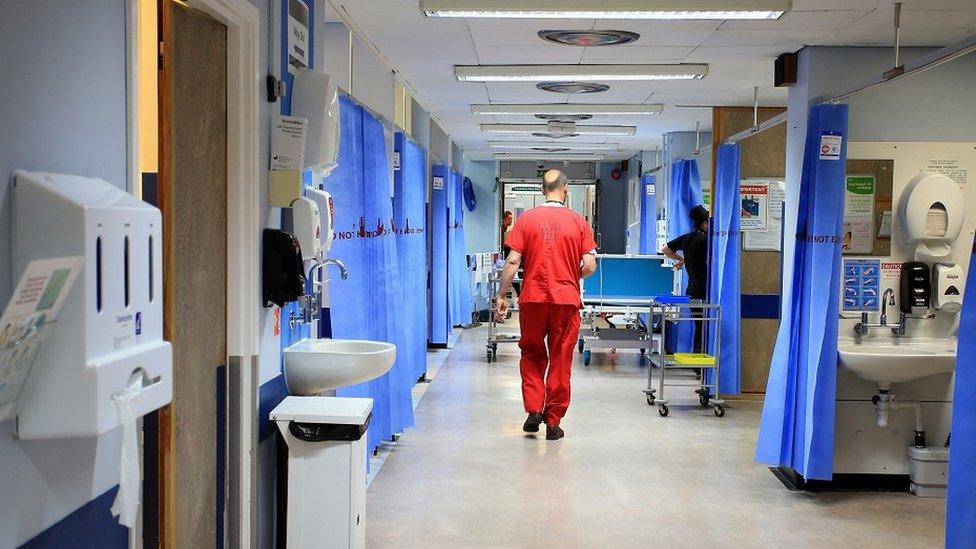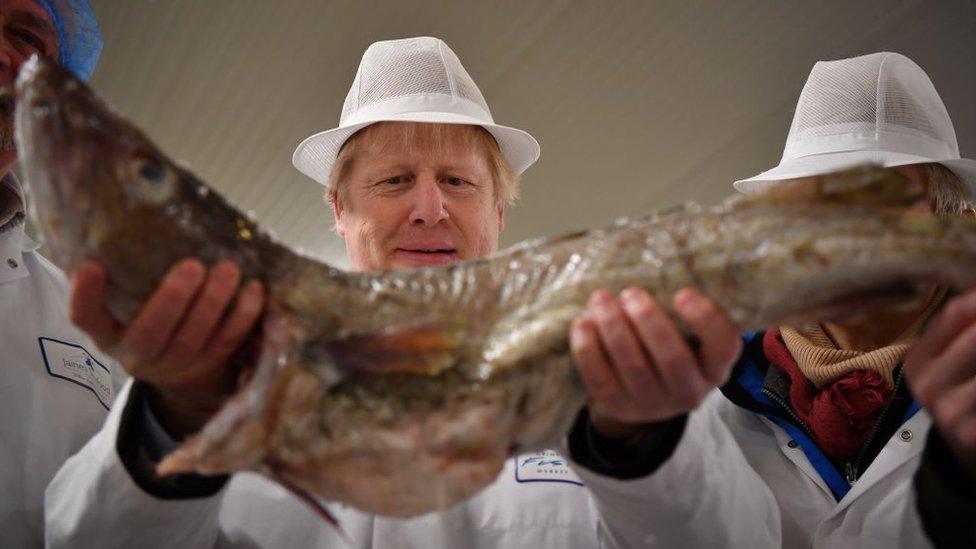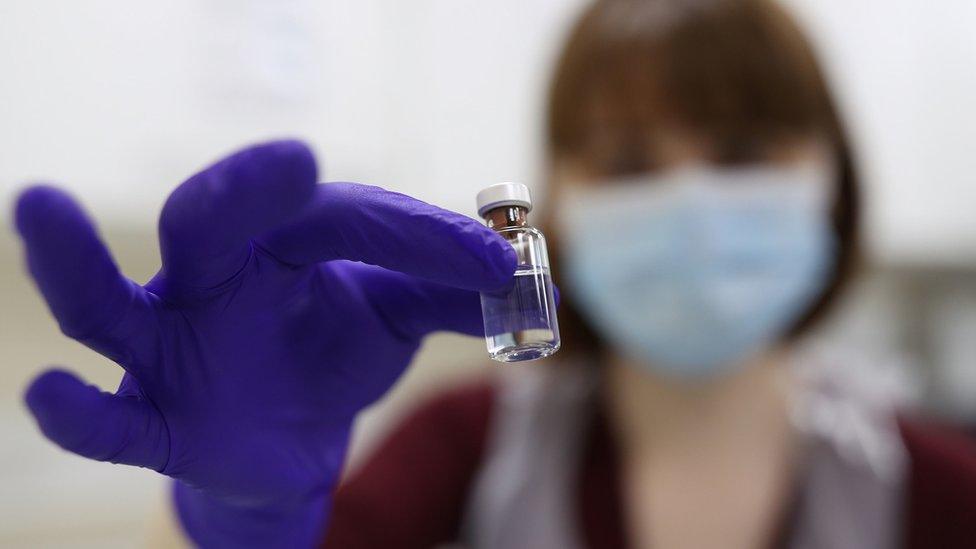Scotland's health chiefs warn of no-deal Brexit risk
- Published
- comments

The NHS is preparing for Brexit at the same time as managing Covid-19 and the winter pressures of flu and bad weather
A no-deal Brexit could threaten safe and effective patient care, a major Scottish health board has warned.
NHS Tayside is preparing for possible service disruption when the transition period ends on 31 December.
The UK and the EU are struggling to strike a post-membership trade deal with the two sides acknowledging "significant differences remain".
Both the UK and Scottish governments have prepared contingency plans in case no agreement is reached.
Whatever the outcome of continuing Brussels talks, continuity of healthcare is a key concern and the NHS across Scotland has reactivated plans drawn up when a Brexit crisis loomed last year.
NHS Tayside is preparing for possible shortages of medicine, equipment and staff - warning that a no deal departure could "lead to an inability to deliver safe and effective care".
The health board serves more than 400,000 patients across Dundee, Angus and Perth and Kinross.
Hold extra stocks
The UK government's department of health and social care said it was working to "help ensure continued supply of medicines and medical products to the whole of the UK at the end of the transition period".
It has asked medicine suppliers to hold extra stock in the UK and has plans to re-route deliveries to the UK if necessary.
Scotland's Health Secretary Jeane Freeman also highlighted the need to prepare.
She said: "We are working with the UK government and other devolved administrations to ensure we have a stockpile of essential medicines, including Covid-19 and end of life medicines."
Ms Freeman added that the country benefited "enormously" from EU citizens who worked in the health and social care sectors.
She said: "We encourage all EU citizens, including those working in the health and social care sectors, to apply to the Home Office's Settled Status Scheme to exercise this right."
In a 34-page Brexit readiness plan released to BBC Scotland in response to a Freedom of Information (FOI) request, NHS Tayside set out potential problems and measures to offset them.
Its concerns are shared by other health boards that have responded to the BBC's FOI.
NHS Lanarkshire considers Brexit a "very high" risk with the "potential to adversely disrupt continuity of delivery of healthcare services".
The board's concerns include possible "interruption to availability of medicines, vaccines, personal protective equipment and essential consumable items".
The NHS is preparing for Brexit at the same time as managing Covid-19 and the winter pressures of flu and bad weather.
Even before the pandemic, NHS Dumfries and Galloway flagged "an unprecedented degree of risk for smooth provision of services" in the event of a disorderly exit from the EU during winter.
Its chief executive, Jeff Ace, has since been appointed to play a leading role in co-ordinating NHS Brexit preparations across Scotland.
What stage is Brexit at?
The UK formally left the EU in January but is able to keep trading in the European single market and customs union until the end of this month.
A trade deal is needed by then to prevent the introduction of tariffs (or taxes) on imports and exports.
Even with a deal, new border controls will take effect from 1 January when the free movement of goods and people comes to an end.
Extra paperwork and checks are expected to cause delays at key border crossings such as Calais-Dover.

Scotland's health boards and the five areas of concern

Procuring equipment for the health service, such as monitors and PPE, could be a concern in the event of a no-deal
Across the health service, some of the key concerns included disruption to supplies and increased costs of medicine; the recruitment and retention of EU nationals in the NHS and procurement process such as the maintaining flow of orders for essential items such as PPE.
1. Medicines
NHS Grampian noted that about 85% of prescription-only medicines are imported to the UK from, or through, the EU single market.
It said medicine shortages, unrelated to Brexit, were increasingly common especially with the strains that Covid-19 has placed on the global supply chain.
The board is concerned that "any customs delays could create disruption at ports and reduce the supply of medicines into the UK from Europe".
To ease any pressure, the UK government has asked pharmaceutical firms to keep six weeks of supplies in the UK and has secured its own cross-channel freight capacity.
NHS Tayside's planning assumptions include "shortages of some medicines, particularly after the first six weeks as stocks reduce".
NHS Ayrshire and Arran has also raised concerns that it may have to plug gaps in supply with more expensive alternatives and that European manufacturers may raise their prices after Brexit.
2. Procurement
NHS National Services Scotland, which bulk buys medical, surgical and cleaning supplies for all health boards, has been building up a Brexit stockpile since September.
Before the end of that month, it had amassed a six-week supply of 80% of the items thought to be vulnerable to any trade disruption.
While the UK is phasing in its new border arrangements over the first six months of 2021, EU member states will be entitled to apply controls from 1 January.
NHS National Services anticipates "disruption if significant volumes of freight arrive at the border without completing the correct formalities".
In a report dated 13 October, it expected to be "able to manage supply chain risks effectively".
NHS Tayside is assured it will have access to sufficient supplies for the first six weeks of 2021 but considers "there may be delays" after that.
3. Workforce
Many health authorities are worried Brexit will reduce the number of EU nationals available to work as doctors, dentists, nurses and in social care.
While those already living and working here can apply for settled status until next summer, NHS Tayside believes "there remains a risk that EU staff will leave the UK".
It expects the UK's new immigration rules to make staff shortages worse and is concerned a post-Brexit drop in the value of the pound would encourage EU workers to return home.
NHS Grampian has raised a particular concern about the impact any loss of EU workers would have on social care provision in the north east.
NHS Borders said that while it was "not overly reliant" on EU nationals "uncertainty remains" about access to European labour after Brexit.
4. Sick and vulnerable patients
NHS Tayside expects existing reciprocal healthcare arrangements with EU countries to break down if there is no deal.
That could lead to many UK nationals coming home for treatment, especially more vulnerable patients such as those who are elderly, disabled or pregnant.
NHS Grampian estimates that as many as 300 UK citizens may relocate to north east Scotland and seek access to healthcare within a 6-12 week period.
5. Costs and other concerns
There is a general concern that the pound could further reduce in value after Brexit, increasing healthcare costs and adding to budget pressures.
While NHS Borders said it had not yet experienced cost increases as a result of Brexit, NHS Ayrshire and Arran reported a 30% rise in some of its IT costs since the EU referendum in 2016.
The Ayrshire and Arran board said there was a "high likelihood" that food supplies would be impacted by Brexit.
While NHS Grampian expects this could affect choice and price, it is confident local supplies will be sufficient to cover any shortages.
NHS Borders has a particular concern about possible restrictions in supply of fresh produce such as fruit and vegetables.
NHS Lanarkshire has registered an unusual risk factor - possible disruption to the normal supply of illegal drugs leading to alternative substances "contaminated with anthrax" reappearing on the market.
The Scottish National Blood Transfusion Service said it was concerned about "disruption to service delivery" if Brexit planning proved to be "insufficient".
It has used "advanced purchasing and extended stock holding" of some key consumable items to guard against possible shortages.
NHS Highland expressed concern that a no-deal Brexit could compound the challenges of winter and "managing the backlog from the Covid-19 pandemic".
NHS Tayside said it was planning a table-top exercise to test the robustness of its Brexit planning.
As well as working on local preparations, NHS Orkney said its staff would be attending a national EU exit planning event on 10 December.
NHS Shetland, in a response dated 11 November, said the Brexit plans it had in place prior to the pandemic were "only now being revisited".
NHS Western Isles said it had made "no updated assessment" of the likely impact of Brexit this year.
All three island boards work together with NHS Highland and local authorities on resilience planning across the Highlands and islands.
NHS Forth Valley said it had "identified risks" associated with Brexit and was monitoring and reporting on them as part of the national response.
Scotland's two largest health boards, NHS Greater Glasgow and Clyde and NHS Lothian have yet to respond to the BBC's request for information.
- Published30 June 2021

- Published18 December 2020

- Published30 December 2020

- Published6 December 2020
